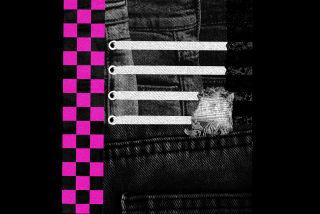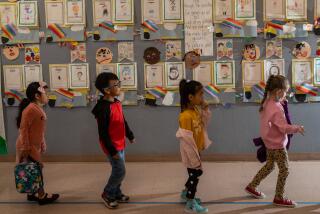Yo! : Slang: It’s no secret that being cool is important to kids. Today’s “in” word is simply part of their own unique argot.
- Share via
The children are acting up again. You hear them on the street corner, in the schoolyard, at the mall: “Hey, Yo! Yo, man, what’s happenin’?”
What is happening, indeed?
What’s with this “Yo” business, anyway?
It depends on whom you ask. There is no shortage of pontificators on the subject.
But a caution: Beware the opinions of assorted social policy experts, political types and ivory-tower intellectuals. Most of these good folk haven’t a clue as to what’s “Yo.” Examples:
* “A salutation among troubled inner-city youth reflecting membership in a pathologically deviant subculture.”
* “A solicitation used by drug dealers meaning, ‘Open for business.’ ”
* “A derogatory reference to black adolescents employed by suburban white kids.”
* “Anyone who carries a gun.”
* “Old south Philadelphia slang for ‘Hello,’ probably derived from the interrogatory, ‘Yoo hoo!’ Popularized by Sylvester Stallone in the first ‘Rocky’ movie.”
* “A gangster or would-be gangster.”
These stereotypical adult responses remind me of those 1950s teen-ager movies in which some lavishly pubescent, elaborately hair-sprayed young ingenue manages to unglue her ear from the rock ‘n’ roll blaring from a transistor radio just long enough to announce, “Gee, this is really cool!” To which her mom replies, “Why don’t you put on a sweater, dear?”
Today the kids shout, “Yo!” and these same dense adults are thinking, “Oh my God, he’s got a gun!” Or: “Thank goodness our little Throckmorton attends private school!”
You want to know what’s really happening?
What’s happening is the kids are yelling “Yo!” and doing a lot of ritualized palm-slapping and checking out the designer labels on each other’s sneakers. And what they’re thinking is: “Gee, this is really cool!”
Being cool is very important to kids, dig?
I checked this out with some, like, very heavy experts, and they’ve finally pulled my coat to what’s “Yo.” To wit:
“Expressions like ‘Yo!’ belong to the specific language of the younger generation,” says Richard Rowe, a program specialist in the Baltimore Mayor’s Office of Youth and Children. “It’s part of their adolescent rebellion.
“Whatever its derivation--drug slang, the movies, ‘rap’ music--the kids have made it their own,” he says. “They pick it up from the streets or from watching music videos on TV. It’s simply a language young people have developed to deal with each other, to make themselves a community.”
“All adolescent boys are ‘Yo’s’,” agrees Bobbe Frasier, director of the Black Mental Health Center in West Baltimore. “It’s what we used to call ‘cool,’ and what our parents called ‘hip.’ Today it’s ‘Yo.’ Like ‘rap’ music, it talks about the children’s aches and pains and what they see. It’s also their commentary on the adult world.”
The biggest difference between today’s young people and earlier generations of youthful rebels, says Frasier, is the context in which their coming of age occurs.
“These are the children of the post-civil rights, post-black nationalist eras, but many of them are growing up in decaying environments and poverty that affects their psychological development,” Frasier says.
“They experience a lot of stress because many of them live in highly stressful situations.So we find that many of them are reflecting a lower self-esteem, a lower sense of control over their lives, and (they) believe their destinies are in the hands of someone other than themselves,” Frasier says.
Rowe and Frasier see the obsession with symbols of material success among “yo-boys” and “yo-girls”--designer clothes, gold jewelry--as reflecting not only a normal adolescent desire to emulate adult status symbols, but also as indications of a deep insecurity, a need to fit in.
And it’s not only black kids who feel that way. A lot of white teen-agers are saying “Yo,” too.
“All kids today are subject to mass-market appeals,” Frasier says. “They may be poor, but they still want things. Some get jobs so they can buy the things they want. And some get involved in criminal activity for the same reason.
“We tend to think of adolescents as indolent, but in reality these kids are long on rugged individualism,” Frasier adds. “They want to ‘live large,’--meaning the opulent life, the color TV, the nice car--even if it’s also a short life. Because all teen-agers, deep down, believe they are immortal.”
Rowe and Frasier blame the media for the negative stereotypes of “Yo-boys,” especially those involving black male teen-agers.
“If these kids were being told on a daily basis that they were winners, that they were loved, maybe they wouldn’t have taken gang culture as their model,” Rowe says. “Young men join gangs because they are not getting the sort of attention--what psychologists call ‘lap time’--that they need. So they identify with that element in society that says ‘you are important.’
“Basically, what this is about is that perhaps we as adults have not been there for our children like we should have,” Frasier says. “We want to blame them for not having the values we want them to have. But the truth is, they are a reflection of what we ourselves are.”
So next time you hear a kid say, “Yo!” don’t panic. He probably doesn’t have a gun. Could be he’s already in private school. The best thing might be just to tell him to put on a sweater. Because he’s, like, “cool.”
More to Read
Sign up for Essential California
The most important California stories and recommendations in your inbox every morning.
You may occasionally receive promotional content from the Los Angeles Times.













